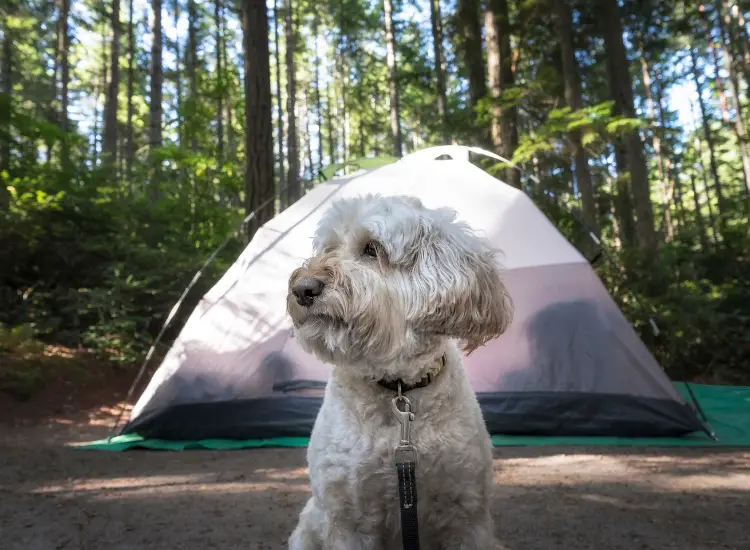How To Choose The Right Camping Dog (Definitive Guide)

Are you looking for the perfect furry companion to join you on your camping adventures? Camping with a dog can make your outdoor experience even more memorable and enjoyable. But with so many dog breeds, it can be challenging to figure out which ones are best suited for camping.
In this article, we will explore some of the best dog breeds for camping. Whether you’re an avid hiker or prefer a more relaxed camping experience, we have a variety of breeds that are well-suited for the great outdoors. From loyal and protective breeds to energetic and adventurous ones, you’re bound to find a four-legged camping buddy that fits your needs and preferences.
Quick Links
Size and Weight Considerations for Camping Dogs
When choosing a dog as your camping companion, it’s important to consider their size and weight. The right size and weight can make a difference in their comfort, agility, and overall enjoyment of outdoor activities. Here are some factors to consider when selecting a camping dog based on their size and weight:
- Portability: Smaller dogs are generally easier to transport and carry, especially if you plan on hiking or backpacking.
- Adaptability: Dogs with a moderate size and weight tend to be more adaptable to various terrains and climates.
- Endurance: Larger dogs often have more endurance and can handle longer hikes or more strenuous outdoor activities.
- Space requirements: Depending on the size of your camping gear and the available space in your tent or RV, the size of your dog can affect their comfort.
- Ability to navigate obstacles: Smaller dogs may have an advantage in maneuvering through narrow trails or rocky terrain.
- Weight capacity: If you plan on using a dog backpack or having your dog carry their own supplies, their size and weight should be suitable for the load.
Consider the specific camping activities you enjoy and the terrain you’ll be exploring when choosing a dog based on their size and weight. It’s important to select a dog that can comfortably and safely navigate the outdoor environment while keeping up with your energy and activity level.
Temperament and Behavior Traits for Camping Dogs
When choosing a dog as your camping companion, it’s important to consider their temperament and behavior traits. Certain dogs are better suited for outdoor adventures due to their natural instincts, energy levels, and adaptability. Here are some key characteristics to look for in a camping dog:
- High Energy: Dogs with a high energy level are more likely to enjoy and thrive in the active and adventurous camping environment. They will be excited and eager to explore, hike, and play.
- Good Temperament: Look for dogs with friendly, sociable, and well-rounded temperaments. Camping often involves encounters with other dogs, wildlife, and unfamiliar people, so a dog that is calm and sociable will have a better camping experience.
- Natural Outdoor Instincts: Breeds with natural outdoor instincts, such as hunting or herding breeds, are often well-suited for camping. They may excel in activities like tracking scents, retrieving objects, or navigating various terrains.
- Adaptability: Dogs that can adapt well to new environments, changes in routine, and unpredictable situations will likely thrive in a camping setting. Look for dogs that are adaptable, resilient, and can handle different weather conditions.
- Trainability: Dogs that are easy to train and have good obedience skills will be safer and more enjoyable to have on camping trips. Basic obedience training, recall commands, and leash manners are essential for their safety and the overall camping experience.
By considering these temperament and behavior traits, you can find a camping dog that will be the perfect adventure companion and make your outdoor experiences more enjoyable for both of you.
Energy Level Requirements for Camping Dogs
Let’s take a closer look at the energy level factor. Different dogs have varying exercise needs and activity levels, and finding a dog that aligns with your camping lifestyle can ensure a harmonious and enjoyable experience for both you and your furry companion.
- High Energy Dogs: These dogs require a lot of exercise and mental stimulation to keep them happy and satisfied during camping trips.
- Moderate Energy Dogs: Dogs with moderate energy levels enjoy a good balance of exercise and rest and can adapt well to camping activities.
- Low Energy Dogs: These dogs have lower exercise needs and are content with short walks and relaxed activities, making them suitable for more tranquil camping trips.
Matching your dog’s energy level with your camping style can help ensure that they are adequately exercised and mentally stimulated, reducing the risk of behavioral issues or restlessness during your outdoor adventures.
Breed Recommendations for Camping Dogs
When it comes to finding the perfect adventure companion for camping, certain dog breeds are better suited for outdoor activities and rugged terrains. Here are some our breed recommendations for camping dogs:
Labrador Retriever
Known for their energy and love for the outdoors, Labrador Retrievers are excellent camping partners. They are loyal, friendly, and highly trainable, making them ideal for various outdoor activities such as hiking, swimming, and fetching.
Australian Shepherd
Australian Shepherds are intelligent, active, and agile dogs that excel in outdoor environments. They have natural herding instincts and enjoy having a job to do. Their endurance and desire to explore make them great companions for camping and hiking adventures.
Border Collie
Border Collies are incredibly smart and energetic dogs that thrive in outdoor settings. They are known for their agility and trainability, making them excellent partners for camping, hiking, and even participating in agility courses or dog sports.
Siberian Husky
Siberian Huskies are bred for endurance and are excellent sled dogs. They have a thick double coat that keeps them well-insulated in cold weather. Their strong stamina and love for running make them suitable for longer camping trips or activities such as backpacking or mushing.
Vizsla
Vizslas are energetic and athletic hunting dogs that make great camping companions. They are known for their endurance and love for outdoor adventures. With proper exercise and mental stimulation, Vizslas can be excellent hiking or camping partners.
German Shorthaired Pointer
German Shorthaired Pointers are versatile hunting dogs that excel in outdoor activities. They are intelligent, energetic, and have a strong instinct to explore. Their natural athleticism and trainability make them well-suited for camping, hiking, and other outdoor adventures.
Remember, every dog is unique, so it’s important to consider individual temperament, health, and activity levels when choosing a breed for camping. Personally, I have an awesome little Havanese, who generally likes to chill and hang out on our laps. Perfect for relaxed camping getaways.
However, the breeds mentioned above, generally exhibit traits that make them more suitable for outdoor adventures and can be wonderful companions during your camping trips.
Training and Obedience Requirements for Camping Dogs
Proper training and obedience are key factors to consider when bringing a dog camping. A well-trained and obedient dog is not only more enjoyable to have on outdoor adventures but also ensures their safety and the safety of others. Here are some training and obedience requirements to keep in mind:
- Basic obedience: Dogs should have a solid foundation in basic obedience commands such as sit, stay, down, come, and leave it. These commands are essential for their safety and control while camping.
- Leash training: Leash training is super important – no matter what activity you’re doing. It’s important for dogs to be comfortable walking on a leash and to respond to leash commands. This will help keep them under control in camping areas and prevent them from running off into potentially dangerous situations.
- Recall training: Teaching your dog a reliable recall command is crucial for their safety during off-leash activities. They should come back to you promptly when called, even in distracting outdoor environments.
- Socialization: Dogs should be well socialized and comfortable around people, other dogs, and various outdoor stimuli they may encounter while camping.
- Leave-no-trace behavior: Dogs should be trained to respect the environment by not disturbing wildlife, not chasing or harassing other animals, and not causing damage to natural surroundings.
- Manageable behavior: Dogs should be trained to have good impulse control and be able to settle down when needed, especially during quiet camping moments or when encountering other campers.
Remember, training is an ongoing process, and it’s important to practice obedience commands and reinforce positive behaviors regularly. Patience, consistency, and positive reinforcement techniques like rewards and praise will help your dog become a well-behaved camping companion.
Common Health Concerns for Camping Dogs
Camping can be a fun and adventurous activity for dogs, but it’s important to be aware of potential health concerns that may arise during outdoor excursions. Taking precautions and knowing how to address these common health issues can help ensure a safe and enjoyable camping experience for your canine companion.
- Ticks: Dogs are susceptible to tick bites, which can transmit diseases such as Lyme disease or Rocky Mountain spotted fever. Ensure your dog is protected with tick prevention medication and regularly check them for ticks during and after camping trips.
- Poisonous Plants: Some plants commonly found in camping areas can be toxic to dogs if ingested. Familiarize yourself with the local plant life and keep your dog away from any potentially harmful vegetation.
- Insect Bites and Stings: Mosquitoes, bees, and other insects can bite or sting your dog, causing discomfort, allergic reactions, or even anaphylaxis in extreme cases. Use pet-safe insect repellents and monitor your dog for any signs of a reaction.
- Heat Exhaustion and Dehydration: Camping in warm weather can put dogs at risk of heat exhaustion and dehydration. Provide plenty of fresh water, keep your dog in shaded areas, and avoid strenuous activities during the hottest parts of the day.
- Wildlife Encounters: Depending on the camping location, your dog may come into contact with wildlife such as snakes, skunks, or raccoons. Be cautious and keep your dog on a leash to prevent any potentially dangerous interactions.
- Paw Pad Injuries: Rough or hot surfaces, sharp objects, and abrasive terrain can cause injuries to your dog’s paw pads. Check their paws regularly for cuts, burns, or foreign objects and consider using protective booties if necessary.
By staying vigilant and being prepared, you can help keep your camping dog safe and healthy throughout your outdoor adventures. If you notice any concerning symptoms or injuries, it’s always best to consult with a veterinarian for appropriate care and treatment.
Final Tips for Camping with Dogs
Camping with dogs can be a rewarding and enjoyable experience for both humans and their furry companions. However, it is important to prepare and plan ahead to ensure a safe and comfortable trip for everyone involved. Here are some tips to make your camping adventure with your dog a success:
Research Campgrounds and Trails
Before heading out for your camping trip, research campgrounds and trails that are dog-friendly. Look for places that have designated pet areas, allow dogs on the trails, and provide amenities like water sources or waste disposal stations. Knowing the rules and regulations beforehand will help you choose a suitable location for you and your dog.
Pack Essential Dog Supplies
Make a checklist of essential supplies to pack for your dog. These may include food, water, bowls, a leash, collar, ID tags, a doggy first aid kit, waste bags, bedding or a crate, and any necessary medications. It’s important to have everything your dog needs to stay comfortable and safe during the camping trip.
Ensure Updated Vaccinations and ID
Before embarking on your camping adventure, ensure that your dog’s vaccinations are up-to-date. This will help protect them from potential diseases they may encounter in the wilderness. It is also important to have proper identification tags with your contact information in case your dog gets lost during the trip.
Train Your Dog for Camping
Ensure that your dog is well-trained and responds to basic commands before taking them camping. This will make it easier to manage their behavior and keep them safe in the outdoor environment. Commands like “come,” “stay,” and “leave it” can be particularly useful when camping.
Keep Your Dog on a Leash
While camping, it is important to keep your dog on a leash at all times, unless in designated off-leash areas. This will prevent them from wandering off, disturbing wildlife, or getting into potentially dangerous situations. Remember to use a sturdy leash to ensure your dog’s safety and your control over them.
Provide Adequate Exercise
Just like humans, dogs require exercise, even more so in the great outdoors. Make sure to provide plenty of opportunities for physical exercise and mental stimulation during your camping trip. Activities such as hiking, playing fetch, or swimming can help tire them out and keep them happy and content.
Keep Your Dog Hydrated
Proper hydration is crucial for your dog’s well-being, especially in outdoor environments. Always carry fresh water and a portable bowl for your dog to drink from. Keep an eye on their water intake and offer regular breaks for them to quench their thirst. Avoid allowing them to drink from natural water sources, as it may contain harmful bacteria or parasites.
Be Mindful of Wildlife
As we mentioned above, when camping in wilderness areas, it’s important to be mindful of local wildlife. Keep your dog on a leash to prevent them from chasing or encountering wild animals. This will help protect both your dog and the wildlife from potential harm. Dispose of waste properly to avoid attracting wildlife to your campsite.
Clean up After Your Dog
Responsible pet ownership includes cleaning up after your dog. Always pick up their waste and dispose of it properly in designated waste stations or bag it and carry it out with you. Leaving waste behind can be unhygienic, harmful to the environment, and disrespectful to other campers.
By following these tips, you can ensure a safe and enjoyable camping experience for both you and your dog. Remember to prioritize their well-being and comfort throughout the trip, and always be considerate of other campers and the natural environment.
Conclusion
When choosing a dog for camping adventures, it’s important to consider their size and weight, temperament and behavior traits, energy level requirements, suitability for outdoor activities, training and obedience requirements, common health concerns, and tips for camping with dogs. By taking these factors into account, you can find the perfect adventure companion and ensure a safe and enjoyable camping experience for both you and your furry friend.
Remember the essentials: research dog-friendly campgrounds and trails, pack essential supplies, ensure updated vaccinations and ID, train your dog for camping, keep them on a leash, clean up after your dog, and prioritize their well-being and comfort throughout the trip. With proper preparation and care, camping with your dog can be a rewarding and truly awesome experience. So get out there and enjoy the great outdoors with your canine companion!







